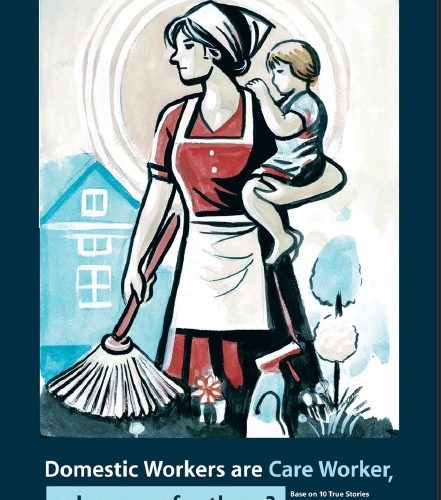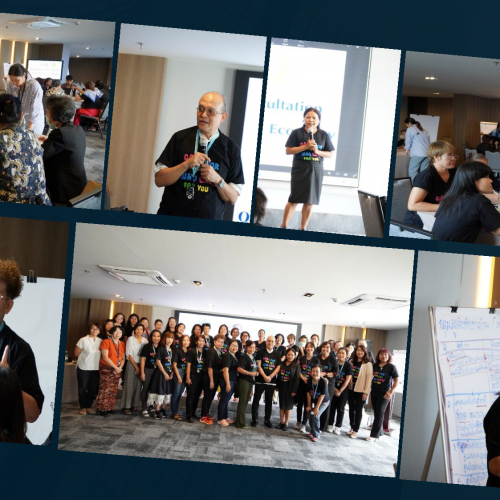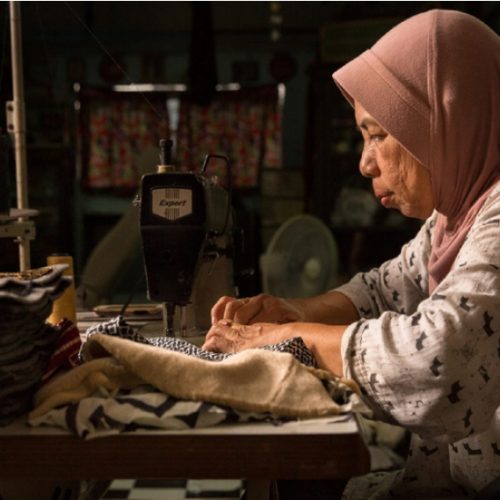About 30 years ago, making sweet fish was a family occupation with about 5-6 people working. Later, the family business grew. This family therefore expanded the business by inviting people from the community in Moo 9, Ban Luek Subdistrict, Photharam District, Ratchaburi Province to work together. The group is named Phetsamut Sweet Fish Processing Group. It operated by mixing micro enterprise and mutual help group principle. The workers are paid according to their performance, but there is also consulting and helping each other between employers and workers. Employers provided essential information on social security scheme to workers and encourage group members to help each other. Currently, in 2022, the group has about 60 members, with about 10 people working in the common house and sub-contracting about 50 people to work from home. There are two jobs subcontracted to homeworkers, cleaning the skewers and skewing work.
Price of the products of Phetsamut Sweet Fish Processing Group started from 35 THB per Kilogram and currently increasing to 90 THB per Kilogram. The group markets its products at Mahachai Wholesale Market, Chonburi Souvenir Market and Roi Et Provincial Market. Previously, there were few competitors, about 3 stores, but at present, it has increased to 14-15 stores. So, there is high competition, each store will reduce the selling price to increase their competitiveness. On the opposite, Phetsamut Sweet Fish Processing Group will focus on different selling points, especially focusing on good quality products, fresh, high fish proportion, less flour and stable taste. Based on this quality, the group can determine the selling price and negotiate with customers.
In 2009, HomeNet Thailand started working with Phetsamut Sweet Fish Processing Group through implementing project activities on Youth Volunteers. The project aims to improve quality of life, Occupational Health, and Safety (OHS) of informal workers by educating young people, children, and grandchildren of those who are homeworkers. They gained knowledge and awareness on OHS as well as environmental problems impacted from production process to the community. After receiving knowledge on OHS and environment at the workplace problems, these youths go back and work with their parents who are members of the group to protect the problems. Later, the leaders and group members learned about OHS and working environment from their children as well as enhancing their understanding on informal workers’ issues, therefore, they realized that joining with the network of Homenet Thailand will directly benefit to them. The group, then, apply to be a member of Homenet Thailand and continuously join Homenet Thailand activities. At present, their representative has been elected as a committee of the Central Region of Homenet Thailand.
During COVID-19 crisis, the group faced serious problems in their operation. In some periods production had to stop. It was restricted by government measures, raw materials and products are unable to be transported at all. The leader of the group had to sell 2 private cars and mortgaged their land to secure a bank loan of 600,000 THB for family expenses, help group members with living expenses and taking care of sick members “Fortunately, we worked with Homenet Thailand to campaign regarding coverage of social security for informal workers. All our members enrolled in the Social Security Section 40 for informal workers. They received both cash grant and sickness compensation. It was sufficient for each family to get food” said the leader of the group.
In the past, Homenet Thailand has been working in studying the production process of the group to analyze and provide knowledge about OHS and environment at the workplace. In addition, Homenet Thailand providing knowledge on labor rights and social welfare but did nothing with group business. Homenet Thailand observed that their business was running well. Until there was COVID-19 crisis, the lockdown policy caused the group to have no income. Sick members have no money for medical expenses and the group has no reserves to help. Therefore, the group leaders and Homenet Thailand came and analyze the problem together. It found out that the group’s business is under a family management, whenever a family leader faced serious problems, other group members can’t move forward. Therefore, they began to develop new plan to work together again.
From the Business Model Canvas Training process that the group received from Homenet Thailand. It helps group leaders and members analyze group operation and found out that the group management is quite simple, there is no system regarding finance, accounting, costing, inventory management, even customers information. Normally, they still worked by using memorization and with small notes. Marketing is running based on experiences of a group leader, lacking situation analysis to move forward.
At the same time, the group developed its skill based on real-world learning. It developed from the experience that has been done and transferred from the past. There is no record or collection of production data at all. To produce sweet fish, there are many techniques such as looking at color of the fish, thickness, or thinness of fish sheets, frying and fire level. Sauce mixing, thick or clear, based on suitable of different kinds of fish. Level of dried fish leads to different production methods. Lack of note taking and transferring production knowledge to others, generated heavy burden on the group leader and the first experienced members. Generally, they had to engage in production process and control the production quality all the time. The head of the group did not have time to look at the overview of the group’s operations. With no one taking care of the overall development, the group lacked product development and other skills development.
Product standard is another important issue that the Group must develop. The group received advice from HomeNet Thailand and the advisory group to apply for standard accreditation from the Food and Drug Authority-FDA. The group has been trying to apply since 2011, but the results of standard assessment from FDA did not pass because the production premises were at the homes. Limitation of the homeworkers is the use of the home as a workplace. They do not have sufficient funds to buy land to build production buildings separated from their homes, so they do not pass the requirement of the FDA.
From the limitations of the group in operating the business in the past 2 years (2021-2022). HomeNet Thailand has therefore come and helping them to improve and develop their business. Starting from finding knowledgeable people in the community to work as a volunteer to help teaching 2 representatives from the group to be able to do record keeping on finance, products, and raw materials inventory. Calculated costs and profits using the simplest form that are not complicated. Some jobs which required specific skill sets such as accounting and finance, the group will hire an expert to work. It found that the initial stage of improving the work style by changing casual habits into day-to-day tasks was quite difficult. In the beginning, they did some things but forgot to do others, the advisory team need to often check. In early 2023, it was found that there was a regular record, some data may not be detailed yet, but it can tell how much profit in each work order or getting a job which risky to be loss or not. It leaded to better planning of raw material procurement. Even during the rainy season, fish often have problems with drying and having poor color, the group still get quality fish products. The group leader told HomNet team that “We can develop well plan to order raw materials. It is expected that this year, sales, and profits tend to be increased not less than 50%”
In terms of skill development, there is a workshop to teach production techniques to members of each division. Recording of production steps and observations, precautions, and problems encountered for further study and review. These information and data will need to be summarized and reviewed periodically for members to gain confidence and be able to take responsibility for their work. At the beginning of 2023, 2-3 members have equipped with better knowledge and understanding that they can produce good quality of sweet fish on their own.
Problems that the group will have to overcome in the future is to create bargaining power with customers on quality of the product, not the price. At present, there are more than 15 sweet fish producers in the area who sell their products at competitive prices. “Our group must develop itself into a market where consumers are health conscious with clean and safety food. Do not compete in a market using price as a final decision which we will have a reasonable profit and able to pay fair wages to the members,” the group leader said.
Currently, the group is gathering fund to build a new production building to meet FDA standard and further applying for Halal standard. Then, the group will produce sweet fish for export. The leader has already known a marketing channel for export, but the group need to develop production skills to be precise and compiled with Halal and FDA standard. The products will have more markets and help increasing members’ income.
Phetsamut Sweet Fish Processing Group started as a family business and being able to develop and support other people to have jobs. Create employment and generate income for more than 50 households in the community for more than 30 years. Most importantly, 80 percent of these workers are elderly people which the group helps them to have a job and earn more self-sustaining from welfare payments from the government. Helping these elderly homeworkers to be proud, feel valued and dignified as same as workers of other ages.
The group is a good example of mutual assistance between a micro enterprise and homeworkers. According to economic conditions, instead of fighting, there will be regularly negotiation on wages payment between head of the group as an employer and homeworkers as employees. Meanwhile, the head of the group will tell all members to apply to be insurers in the Social Security Scheme, Article 40 to gain benefits from the government when there is a risk. Homeworkers will receive knowledge and encouragement to have greater access to social protection scheme provided by the government. In addition, the leader of the group will always support the group members when they are in trouble. It is considered as one of the groups that practicing social solidarity economy principle.
Kanoknart Thepnupa
Homenet Thailand
April 2023






